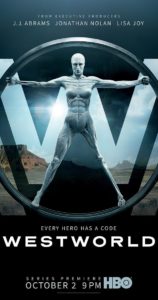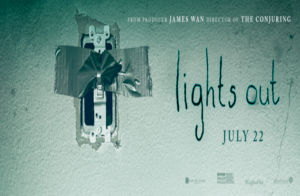I have now watched all the episodes in season one of HBO’s SF series
Westworld; what follows will have spoilers about the entire season and as such if you have not watched the

series and you want to remain, like the hobbits, unspoiled you should stop reading now.
I was certainly intrigued by the idea of taking the 70s Michael Crichton film and expanding it a full television series. For those unaware of the original movie, robots in a theme park malfunction going on a murderous spree until we are reduced to one robot and one human in a game of survival. Really it has a very Terminator feel to it and it is a decent film but the plot is rather thin for a series.
Jonathan Nolan, brother and frequent collaborator with Christopher Nolan teamed up with his wife Lisa Joy and J.J. Abrams to create this visually stunning, expertly produced, and deeply plotted show. The talent involved is tremendous and the story arc as it progresses through the 10 episodes is intelligent, engaging, and ultimately unsatisfying.
Why the series let me down is very much connected to my last posting on Promise and Flavor in storytelling.
When the first episode open we are following Teddy, a likeable protagonist with what appears to be a good strong moral sense. He quickly becomes reacquainted with Dolores, a farmer’s daughter who sees the beauty in this world and it si clear that they have a history. That night bandits attack Dolores’ farm, Teddy rides to the rescue and defeats the thugs, but then the twist occurs. The Man in Black arrives, defeats Teddy because Teddy is a robot and unable to harm the Man in Black who is human. Having defeated Teddy the Man in Black takes Delores to the barn to sexually assault her.
What does this opening promise us and what flavor are we led to expect?
Playing with our expectations, Teddy isn’t a “guest’, a human playing a game, but a ‘Host’ sets up that this is going to be a story of facades and hidden truths, Dolores’s optimistic views that their is beauty in this world promises an affirming story.
By the end of episode 10 things are very different. We have learned that The Man in Black is William, a guest who 30 years ago fell in love with the host Dolores but the park has awaken and or revealed his true darker nature as a sadist and rapist. Humans turned out to be hosts, hosts overcoming their programing turned out to be puppets playing out someone else’s agenda, the park’s brilliant creator, Dr Robert Ford’s assertion that humanity is a vain, pointless thing no different than the hosts goes unchallenged. The series ends with a massacre of the guests, which Dolores not only take part in but also instigates and leads.
The story’s end is consistent and doesn’t violate any internal logic, the production was outstanding and the performances truly marvelous, but I was left with a bad taste. This ending so dark and cynical seems at odds with the promise and as such I was repulsed by the conclusion.
I know this is not squeamishness on my part. No one who loves film noir can be against cynicism in stories. The deeply dark and cynical movie Night Crawler works for me, but its tone and promise are consistent from start to finished and I do not think this is the case with Westworld



